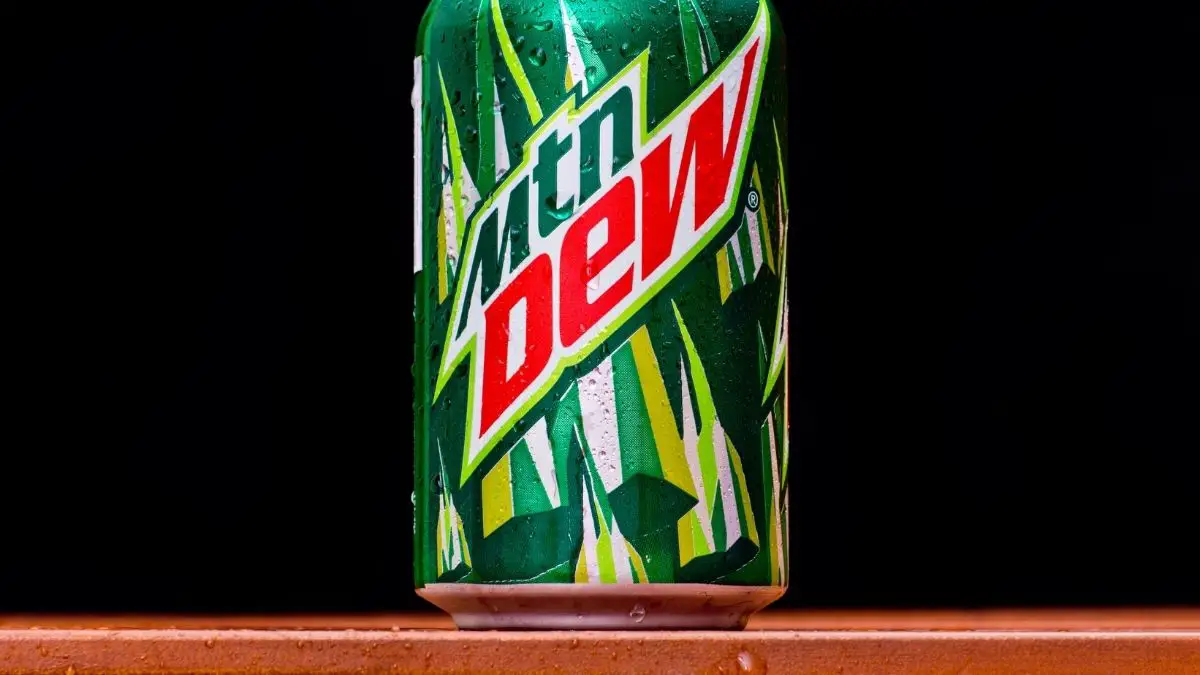As enjoyable as coffee may be, drinking the same beverage over and over can eventually get a bit dull. That’s precisely why caffeine lovers are constantly on the lookout for drinks that can potentially serve as an alternative to coffee. If you’re one of these individuals, you might be familiar with the recent talks pertaining to Mountain Dew and its correlation with caffeine.
According to recent studies, Mountain Dew ranks pretty high among soft drinks in terms of caffeine content, although it still pales compared to the caffeine in actual coffee.
So, can you substitute coffee with Mountain Dew? Well, to answer that question, you’ll need to learn more about this soft drink first. Let’s start by going over a brief overview of Mountain Dew.
Mountain Dew: A Brief Overview
Mountain Dew is a citrus-flavored soft drink owned and manufactured by none other than PepsiCo, the same brand that owns other beverages like Gatorade, Pepsi, 7 Up, and Tropicana.
The drink’s color appears to be greenish-yellow, and this color is made even more delectable as it comes in green-tinted bottles. It’s known for many things, one of which is its ability to give its consumers a caffeine buzz that they won’t find from other soft drinks. That’s precisely why many people, including you, take an interest in its correlation with coffee, or caffeine, in general.
Caffeine Content: Mountain Dew Vs. Coffee
As stated earlier, Mountain Dew is known for its caffeine content to the point where consumers go as far as to compare it with coffee, the primary source of caffeine in most people’s diets.
So, how much caffeine does Mountain Dew contain as opposed to coffee?
Well, to start with, Mountain Dew has 54 milligrams of caffeine per can, which has roughly 12 ounces of the drink. On the other hand, regular coffee has around 140 milligrams of caffeine in that same serving size, so the difference is relatively huge. But that’s not to say Mountain Dew has low caffeine content. In fact, it has more caffeine than most caffeinated drinks.
The following list might help prove this point:
- Brewed Tea: 60 mg per 12 ounces
- Instant Tea: 45 mg per 12 ounces
- Pepsi One: 58 mg per 12 ounces
- Diet Coke: 46 mg per 12 ounces
As you can see, it has more caffeine than instant tea, which is also known for its caffeine content. It may have lower caffeine than Pepsi One, but Pepsi One is sugar-free, meaning its flavor mostly comes from caffeine. That says a lot about Mountain Dew, which only has four milligrams less and is by no means sugar-free, as it’s also known for its high sugar content.
Take note that 140 milligrams is a rough estimate for coffee.
For example, decaf coffee contains only 12 milligrams of caffeine per 12 ounces, while espresso has 63 milligrams of caffeine per ounce or 756 milligrams per 12 ounces.
That’s about 13 times the caffeine in Mountain Dew! But then again, the Mountain Dew brand also has its own varieties, some containing higher amounts of caffeine than the others.
Caffeine Content In Different Mountain Dew Varieties
From the 1940s up to the 1980s, there was only one known variety of the Mountain Dew drink, which is now often referred to as the original flavor. That was until 1988 when Diet Mountain Dew was introduced in the market. It was then followed by Mountain Dew Red, the first-ever flavor variant of the brand, although it’s no longer available as it was discontinued in 1988.
This pattern continued until today. Now, the drink comes in multitudes of flavors. As one might expect, there are differences between each variation, including caffeine content.
In that regard, here’s a list of Mountain Dew varieties and their caffeine levels:
- Diet Mountain Dew: 54 milligrams (12 ounces)
- Mountain Dew Baja Blast: 54 milligrams (12 ounces)
- Mountain Dew Code Red: 54 milligrams (12 ounces)
- Mountain Dew Live Wire: 54 milligrams (12 ounces)
- Mountain Dew Major Melon: 55 milligrams (12 ounces)
- Mountain Dew Voltage: 55 milligrams (12 ounces)
- Mountain Dew Zero Sugar: 68 milligrams (12 ounces)
- Mountain Dew Game Fuel: 90 milligrams (16 ounces)
- Mountain Dew Kickstart Series: 90 milligrams (16 ounces)
- Mountain Dew Amp: 142 milligrams (16 ounces)
- Mountain Dew Rise: 180 milligrams (16 ounces)
Take note that this list does not include every Mountain Dew variety in existence. Nonetheless, this should tell a lot about the diversity of the beverage in regards to caffeine content.
However, as fascinating as it may be to know that it can contain up to 180 milligrams of caffeine, you must remember that there are other differences between coffee and Mountain Dew.
What Are Some Other Differences Between Coffee And Mountain Dew?
Apart from their caffeine content, coffee and Mountain Dew also differ when it comes to the following characteristics:
pH Levels (Acidity)
Mountain Dew has a pH level of 3.1, while coffee generally has a pH level of around 4.85 to 5.10.
Take note that the acidity level may decrease the longer you roast the coffee beans.
This is because acids are lost during their roasting process. That’s also why the dark roast variety is the least acidic among the different varieties of coffee as opposed to medium or light roast.
Sugar Levels
It’s no secret that most coffee varieties contain little to no sugar unless you add some after preparing the beverage. Mountain Dew, on the other hand, is the exact opposite.
This soft drink contains a whopping 46 grams of sugar in a 12-ounce can. Yes, that number is high, high enough for Mountain Dew to be considered the soda with the highest sugar content. But as impressive as that may be, its massive sugar content is also the main reason why Mountain Dew can never be a good substitute for coffee solely for its caffeine.
Is Mountain Dew A Good Source Of Caffeine?
While Mountain Dew does contain a good amount of caffeine and can give you that caffeine buzz, it’s not a good idea to treat this drink as your primary source of caffeine for several reasons.
One, its sugar content is too high, as mentioned in the previous section. Two, Mountain Dew and its varieties consist of food dyes, artificial flavors, and other chemicals that aren’t good for your health. In fact, PepsiCo has faced several lawsuits over the adverse effects that it supposedly causes to its consumers. Examples of such effects include mouth decay and weight gain.
In other words, unless it’s the only beverage available to you, there are many other drinks out there that are far healthier than Mountain Dew that also contains a good amount of caffeine.
Besides, there’s really no reason to replace coffee with anything else.
Why You Should Stick With Coffee For Your Caffeine Needs
Although people often drink coffee purely for its taste, there are many other reasons why coffee is one of the most consumed beverages in the world.
Coffee Can Help You Burn Fat
Yes, coffee, or more specifically, caffeine, can boost your metabolic rate as well as the rate at which your body burns fat. Furthermore, coffee inherently contains more potassium than tea, as well as a decent amount of magnesium. These two elements are essential to weight loss.
Coffee Can Protect You Against Diseases
Coffee also contains antioxidants, which are crucial for fighting diseases. Experts explain that this is also the reason why coffee consumption is linked to a lower risk of heart disease and cancer.
Coffee May Improve Cognitive Health
While it’s not yet clear if it’s indeed true, recent studies show that coffee is linked with lower risks of neurodegenerative diseases like Parkinson’s and Alzheimer’s disease.
Mountain Dew and coffee are similar in the way that they both have several varieties that you can try out. If the flavor you’re used to is no longer as exciting as it used to be, you can always spice it up by trying out new varieties, like espresso, americano, or cappuccino. Who knows? Maybe you’ll find that one coffee variety that will rekindle your love for your favorite beverage.
Final Thoughts
While it does give a lighter caffeine buzz compared with the average cup of coffee, there’s no denying that Mountain Dew does indeed contain a significant amount of caffeine.
However, you must remember that the soft drink brand, Mountain Dew, has long been the center of controversies since its founding. One of the most popular ones relates to its potential adverse effects on one’s health. Therefore, although it may be tempting, health experts advise against drinking Mountain Dew as your primary source of caffeine. Of course, a few cans or bottles shouldn’t be fatal, but this is one of those times where moderation is critical.

